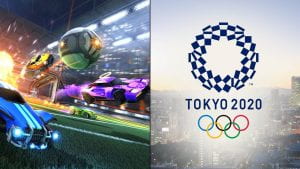The difference between “traditional” sports and Esports has been a long-debated subject. What defines an “Esport”? This week on Erik Kersting’s excellent Twitch show The Arena, he, along with guest hosts Janelle Malagon and visiting Fulbright Scholar Daniel Marques, probed this question. Playing the popular Rocket League, a competitive multiplayer game that puts players behind the wheel of various vehicles while playing a soccer-a-like sports game, the streamers contemplated why Rocket League was selected by the Olympic Committee to be presented in an event during the lead-up to the 2020 Summer Olympics in Tokyo, Japan. Daniel was particularly interested in why Rocket League, a game that is very similar to soccer, was chosen over a game such as FIFA 20, which is an actual soccer video game.
First, it’s useful to establish the differences between Rocket League and FIFA 20. While both games feature a similar set of basic rules, involving each team attempting to move a ball into a goal on the opposite end of the field, the specifics of how the games are played is quite different. Rocket League features a third-person camera that centers on the player’s vehicle, with a forward-facing locked perspective. While the field-of-view is quite large, it’s impossible to know exactly what is happening on the pitch outside of the player’s locked view. FIFA 20, conversely, utilizes a zoomed-out view, allowing a player to see the entire field, and each of the involved digital avatars, at any time. The game features camerawork between plays and during breaks that deliberately echoes the camerawork of broadcast soccer. Rocket League features rules and objectives familiar even to non-gamers, due to its similarity to soccer. Unlike other popular competitive game types, such as MOBAs and FPSs, Rocket League does not require preexisting familiarity or skill within its genre for either players or spectators. This is all to say that Rocket League more closely replicates the embodied experience of playing soccer, while FIFA 20 replicates the mental and affective experience of watching soccer.
The Olympic Committee may have chosen a game like Rocket League over FIFA 20, or other similar sports games, specifically in preference to this embodied play experience over that of spectatorship. Yet, a look at the economic realities might offer a simpler solution. The cost of licensing a game like FIFA 20, owing its title to the most powerful sports organization in the world, and published by EA Sports, one of the largest and most profitable game publishers, would be tremendous and therefore unlikely to happen. Rocket League, by comparison, is published and developed by the small San Diego studio Psyonix, significantly reducing licensing costs.

Between the differences in how Rocket League and FIFA 20 are played, and the dramatic difference in licensing costs, it is easy to guess why the Olympic Committee, and their partners at Intel, might prefer the former. There are also arguments to be made about the experience of watching each game, and how the playing of FIFA 20 might invite unwanted criticism or comparisons to real life soccer matches taking place during the Olympic Games themselves. While esports has become a massive industry, its ability to be accepted in such a competitive cultural space as the Olympics remains uncertain. Time will tell.
Dave Stanley

Oh yeah, I bet licensing, more than anything, is one if not the biggest obstacle getting a game like FIFA to be included in an esport event in the Olympics. I mean, this is EA we’re taking about…
I agree with you. I think its a strong possibility, but am still really curious about why Rocket League. The other game they are showcasing is Street Fighter 5, a game local and popular in Japan, but not nearly as easy to watch/play as Rocket League is. So some of my argument there goes somewhat in a different direction considering that.
hey dave
Hello Tommy.